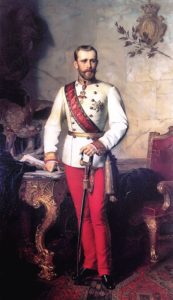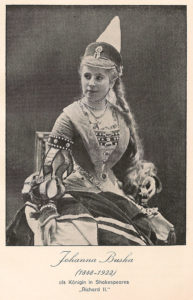by Greg King and Penny Wilson
On a snowy January morning in 1889, a worried servant hacked open a locked door at the remote hunting lodge deep in the Vienna Woods. Inside, he found two bodies sprawled on an ornate bed, blood oozing from their mouths. Crown Prince Rudolf of Austria-Hungary appeared to have shot his seventeen-year-old mistress Baroness Mary Vetsera as she slept, sat with the corpse for hours and, when dawn broke, turned the pistol on himself.
A century has transformed this bloody scene into romantic tragedy: star-crossed lovers who preferred death together than to be parted by a cold, unfeeling Viennese Court. But Mayerling is also the story of family secrets: incestuous relationships and mental instability; blackmail, venereal disease, and political treason; and a disillusioned, morphine-addicted Crown Prince and a naïve schoolgirl caught up in a dangerous and deadly waltz inside a decaying empire. What happened in that locked room remains one of history’s most evocative mysteries: What led Rudolf and mistress to this desperate act? Was it really a suicide pact? Or did something far more disturbing take place at that remote hunting lodge and result in murder?
Drawing interviews with members of the Habsburg family and archival sources in Vienna, Greg King and Penny Wilson reconstruct this historical mystery, laying out evidence and information long ignored that conclusively refutes the romantic myth and the conspiracy stories. Read an excerpt from Twilight of Empire below.
* * * * *

“Love,” wrote Rudolf at fifteen, “is certainly one of the most beautiful things in the life of all living things.” A year earlier Latour von Thurmberg had escorted him to a fish hatchery, where doctors explained the facts of life. Abstraction gave way to reality when, according to rumor, Franz Josef tasked an adjutant with procuring a healthy, discreet young woman to shepherd his son through his first sexual encounter.
A perfect storm quickly surrounded Rudolf. “What temptations assail such a young man!” worried one of his mother’s ladies-in- waiting. Youth, wealth, and rank, he soon discovered, had their privileges. “Female hearts positively dropped into the lap of the Crown Prince,” noted a counselor at the German Embassy in Vienna. Many young ladies considered “surrender to the young, elegant and charming Prince” as nothing short of “a patriotic duty.”
Rudolf, said a cousin, “was mad about women,” and saw no reason to deny himself. The Prince of Wales had recorded of the nineteen-year-old who visited London in early 1878, “For a young
man of his age, it is surprising how much Rudolf knows about sexual matters. There is nothing I could teach him.” Rudolf wasn’t discreet about his interests, and he made few distinctions between
the married and the unmarried; his romantic overtures to Archduchess Maria Theresa, the third wife of his uncle Archduke Karl Ludwig, strained an already bad relationship. Not that Rudolf’s
taste remained consistent for long: After using his position to charm numerous women to bed, he usually grew bored and soon moved on to a new liaison.
A courtier recalled that Rudolf had “very little regard for women, outside their appointed role in the order of things”—in other words as submissive wives and mothers. His approach was cynical.
Women, Rudolf declared, were “eternal victims of self-delusion,” willing to abandon any principles in pursuit of romance. A streak of misogyny infused his perception: “How tedious some women
can be!” he once complained. “Women bore me to death when they are not laughing or singing. As a matter of fact, are they good for anything else?”

These affairs were physical, not emotional, and Rudolf viewed them through a curiously bureaucratic lens. The names of his sexual partners were entered in a ledger, with red ink used to denote
those women Rudolf had deflowered, and black deployed for other conquests. He developed a system every bit as rigid and snobbish as the court’s Spanish etiquette to reward his partners. Those
belonging to princely families recognized as being of equal rank for the purposes of marriage received a silver box engraved with a copy of Rudolf’s signature and coat of arms; noble ladies admitted to court but not of equal rank were given boxes stamped with his name and coat of arms, while those who lacked entrée received boxes engraved with his name and archducal crown.12 Dispatch of a silver box inevitably marked the beginning of the liaison’s end, usually accompanied by a warm though unmistakably final note: Rudolf asked one woman, whose virginity he had taken to remember him as the person who “introduced you into the mysteries of love.” His “propensity for easing persons from the memory” was true of his sexual conquests: “As soon as they had been presented with their cigarette boxes and been duly entered in his register,” wrote one relative, “the matter was closed for him, for there was little these women could give him. His sexual indulgence was curiosity rather than the urge to satisfy a physical appetite, and curiosity in this sphere was soon satisfied as there was little that was novel in it.”
Some of these liaisons, however, were more serious than others. In 1880, the crown prince supposedly secretly married his distant Habsburg cousin Maria Antonia, daughter of Grand Duke Ferdinand IV of Tuscany, when she became pregnant. As she was dying of consumption, it is said, the emperor had the marriage annulled; Maria Antonia died in 1883, after allegedly giving birth to Rudolf’s son in 1881. An affair with the Viennese actress Johanna Buska is also said to have led to the birth of an illegitimate son in 1881. Rudolf apparently didn’t trouble himself over such developments: Indeed, his grandson Prince Franz Josef von Windisch-Grätz once claimed that his grandfather had more than thirty illegitimate children. Mothers were bribed into silence, their children soon forgotten.
GREG KING is the author of several internationally published works of history, including The Assassination of the Archduke. He serves as Editor-in-Chief of the European Royal History Journal, and his work has appeared in Majesty Magazine, Royalty Magazine, Royalty Digest, and Atlantis Magazine.
PENNY WILSON is the coauthor (with Greg King) of such histories on late Imperial Russia as The Fate of the Romanovs and The Resurrection of the Romanovs. Her historical work has appeared in Majesty Magazine, Atlantis Magazine, and Royalty Digest.
